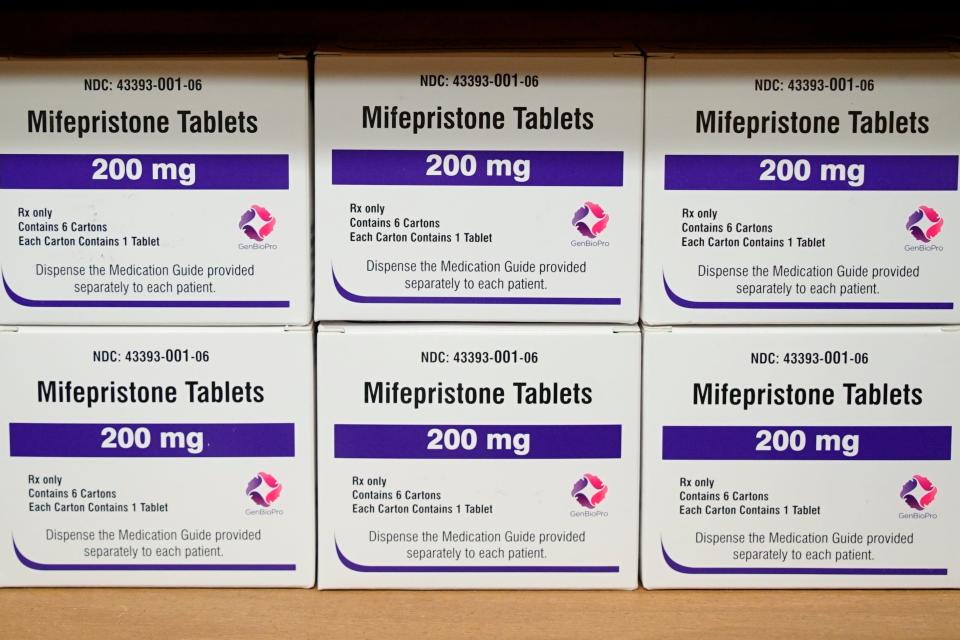Appeals court backs limits on access to abortion pill mifepristone. What does that for Florida?
The battle against the abortion pill continues as an appeals court Wednesday sided with part of a U.S. District Court's ruling from April that blocked a move by the FDA to allow the drugs to be dispensed through the mail.
The appeals court also ruled against FDA decisions in 2016 to let pregnant people take the drug three weeks longer into a pregnancy and to let pharmacists prescribe the drug instead of just doctors.
How does this affect pregnant people in Florida? Not that much, so far.
What are abortion pills?

Mifepristone and misoprostol are drugs used together to end a pregnancy within 70 days (10 weeks) without the need for invasive surgery.
Abortion by pill is used in just over half of all terminated pregnancies in the U.S., according to the Guttmacher Institute.
What is mifepristone? How do abortion pills work?
The medication abortion process starts when a person takes the first pill, mifepristone. Mifepristone stops the “supply of hormones that maintains the interior of the uterus," according to the Mayo Clinic.
Between 24 and 48 hours after, the person takes misoprostol, which typically comes in four tablets. A patient may either put two in each cheek and let them dissolve, or the pills can be inserted into the vagina. Within a few hours, the misoprostol will cause a person’s cervix to dilate and their uterus to contract, emptying the embryo from the person’s uterus.
Misoprostol can and often is used by itself for abortions, although there may be a greater chance of side effects. A large number of government agencies and outside experts have said the drug is safer than common drugs such as Tylenol and Viagra. But anti-abortion groups challenging the drug question those studies and argue that the FDA didn't follow its own protocols and ignored contrary data as it expedited the drug's approval.
Banning mifepristone, as the April lawsuit sought to do, would be another blow to abortion access started with the Supreme Court's overturning of Roe v. Wade last year and could affect medication abortion access for about 64.5 million women of reproductive age nationwide, according to an analysis released Feb. 10 by NARAL Pro-Choice America.
Did a judge block abortion pills?
In April, U.S. District Judge Matthew Kacsmaryk, nominated to the bench by former President Donald Trump, suspended the FDA's approval of mifepristone while a lawsuit challenging the safety and approval of the drug continues. That kicked off a series of events:
Minutes after that suspension, a federal judge in Washington, Obama appointee U.S. District Judge Thomas O. Rice, ordered the FDA not to make any changes that would restrict access to the drug in 17 states and D.C. that sued to expand access to mifepristone.
A federal appeals court in Louisiana ruled that the 23-year-old approval FDA approval could continue but blocked the FDA moves in 2016 and 2021 that expanded access to the drug.
The Biden administration has asked the Supreme Court to step in. The Court temporarily suspended the lower court's ruling to give time for the FDA to submit a written argument and to give time for the justices to review the arguments and decide the case.
On Aug. 16 a ruling from the three-judge panel of the New Orleans-based 5th U.S. Circuit Court of Appeals, all three of whom were nominated by Republican presidents, upheld the parts of the initial suspension that blocked mifepristone from being sold through the mail and an FDA decision in 2016 to let pregnant people take the drug three weeks longer into a pregnancy and to let pharmacists prescribe the drug. The parts of the lawsuit that challenged the FDA's approval of the drug itself and its approval of a generic version were not upheld.
The Supreme Court decision to pause any changes to the status quo until they rule on the Biden administration's appeal means nothing changes, yet.
Are abortion pills legal in Florida?
So far, but Florida has its own abortion pill battle going on.
Last year the legislature under Gov. Ron DeSantis banned most abortions after 15 weeks of pregnancy, down from the previous 24 weeks. A circuit judge ruled it was unconstitutional and clashed with an earlier state Supreme Court ruling, which concluded that abortion is protected by the Florida constitution’s right to privacy. The Florida Supreme Court has said it will hear arguments on Sept. 8.
If the court rules in the state's favor, the even more restrictive 6-week abortion ban passed this year will immediately go into effect, and that one also takes aim at abortion pills.
In the new changes included in SB 300, Pregnancy and Parenting Support: "A physician may not use telehealth as defined in s. 456.47 to perform an abortion, including, but not limited to, medical abortions. Any medications intended for use in a medical abortion must be dispensed in person by a physician and may not be dispensed through the United States Postal Service or by any other courier or shipping service."
How do you pronounce mifepristone?
The drug is pronounced mif-uh-pristone, with the last syllable pronounced like the rock: stone.
This article originally appeared on The Daytona Beach News-Journal: Abortion pill battle: What do the limits on mifepristone access mean?

